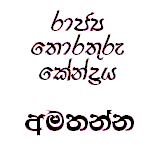| අවශ්ය පෝරම Fees Services Scope of Accreditation Certificate | |||||||||||||||||||||
Metrology/Calibration |
|
||||||||||||||||||||
Directors’ Message��|� Scope of Accreditation�|��Services� |��Application Requirements��| �Fees� |� Contact Us� |� Certificate of accreditation A Milestone in National Measurement System Of Sri Lanka Metrology is the science and technology of measurement. Knowledge depends largely on measurement. Instrumentation, which is the technology of measurement, serves not only science but also all branches of engineering, medicine and almost every human endeavor. To meet the requirements for this wide range of measurement capabilities developed nations maintain extensive national measurement systems. The concept of traceability of the results of measurements is central to the structure of a national system of measurement so that measurement results have a line of traceable calibrations, which relate ultimately to national and international Measurement Standards. To control a quantity one must be able to measure it. The need for reliable measurements, traceable to internationally accepted measurement standards, has never been more pressing. Even within established fields of measurement there is a continuing need for more accurate measurements over an ever increasing range of values. Whatever the nature of application, intelligent selection and use of measurement equipment depends on a broad knowledge of what is available and how the performance of the equipment suits it to the job to be done. There is a need throughout all industry, testing and calibration laboratories for improvement in measurement skills because modern society is very much dependent on accurate and reliable measurement results. Accreditation allows people to make an informed decision when selecting a laboratory, as it demonstrates competence, impartiality and capability 2009 is a special year for the Metrology Division of Sri Lanka Standards Institution (SLSI), as it has been awarded the ISO/IEC 17025 accreditation by Sri Lanka Accreditation Board for Conformity Assessment (SLAB), a time to celebrate our achievements and look forward to more exciting progress. There is no doubt that we face many new challenges. As an ISO 17025 accredited laboratory, the Metrology Division of Sri Lanka Standards Institution (SLSI) is ready to meet the challenges of the increasingly competitive world of quality measurements. To thrive in this market place requires commitment and energy - qualities exhibited by those who work in the Metrology Division. Industry increasingly recognizes that, in today’s demanding and competitive markets, good product design and efficient manufacturing must be supported by properly authenticated measurement and testing. Purchasers and consumers are equally concerned that the quality, performance and reliability of goods meet their requirements and are less tolerant of failure to meet the requirements implied in the concept of a quality product. For its economic survival, in particular for the survival of its manufacturing industry, Sri Lanka must adopt attitudes and practices, which lead to products and services which can compete in the world markets. This can only be achieved through a well-established national measurement system. The national measurement system (NMS) is responsible for stimulating good measurement practice and enabling business to make accurate and traceable measurements for the benefit of the nation. This is delivered through maintaining the measurement infrastructure, representing Sri Lanka’s position internationally. Good measurement practice results in a better quality of life, through improved trade and consumer protection, a healthier environment and more effective health and safety measures. It also improves the competitiveness of business both at home and in export. As an accredited calibration laboratory, the Metrology Division of the Sri Lanka Standards Institution fulfills this national obligation by being a part of our national Measurement system. The cost of making accurate and reliable measurement is high, but the be cost of bad measurement is even higher � Request must be in the form of a written request addressed to the Director. The request may be sent by e-mail, post or faxed to the numbers given in CONTACTS. Any technical information can be obtained from respective technical managers. The request shall include at least the following information 1. Type of equipment 2. The quantity from each type of equipment 3. Unit of measurement 4. Range of measurement (this may not necessarily be the designed range of the instrument. It can be a sub range, sometimes called the working range) 5. Pressure medium for pressure gauges, required or operating temperature points for ovens, incubators, furnace. 6. In case of multi unit instruments preferred unit. Please note that if unit is not defined calibration will be done in SI units. 7.Preferred calibration location. Please note that for certain types of calibration, the item must be sent to the SLSI laboratory. This can be arranged in consultation with the laboratory. 8. Expected level of accuracy. This is NOT the LEAST COUNT or DIVISION of an instrument. This is what you expect from the result of a measurement. The above information�is necessary to avoid delays. Division of Metrology
| |||||||||||||||||||||
පැමිණිල්ලක් කරන්න |
| අවසන් වරට යාවත්කාලීන කලේ: 2017-10-06 11:39:49 |









 Metrology/Calibration
Metrology/Calibration






















